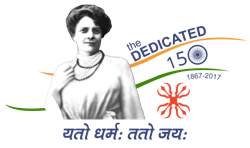Another writer whose work Nivedita took up was Dinesh Chandra Sen. When he was writing A History of the Bengali Language and Literature, he asked her to edit it. According to Barbara Foxe: 'It took them a year, often working all day. He, too, was mothered and encouraged by Nivedita, who scolded him for his timidity, and his lack of interest in politics, as frankly as she praised his hard work.'
Nivedita was a hard taskmaster and some times demanded that he revise parts of the book she did not like or agree with. The arguments at The House of the Sisters went on, but Dinesh took it all with good grace. Yet, on Nivedita's side, in a letter to the Ratcliffes, she called the book 'really magnificent' and 'a perfectly splendid book'. And in another letter to the Ratcliffes, she rejoiced in the new ideas on India—and Bengal in particular—that she had received from the book. When it was finally finished, Nivedita refused to allow Sen to give her any credit or to mention her in it.
Dinesh later wrote, 'I have only read in the Gita about selfless work, but have hardly come across anyone with detachment like hers.'
Nivedita first met Rabindranath Tagore in 1898, soon after she came to India. Hearing that she was there to work for the education of Indian women, Tagore wanted her to give his daughter a proper British education. When Nivedita refused—as she felt the girl should be educated according to Indian ideals—Rabindranath was impressed. He then offered to let her use part of his house for a school, but she again refused. According to Pravrajika Atmaprana, 'It is said that it was Nivedita's deep respect and love for the Hindu religion and apathy towards the English that inspired him to depict the character of Gora in his novel of the same name.'
From : Pravrajika Shuddhatmaprana : Pravrajika Shuddhatmaprana is a senior Sanyasini of the Sri Sarada Math and Ramakrishna Sarada Mission...to be continued

No comments:
Post a Comment